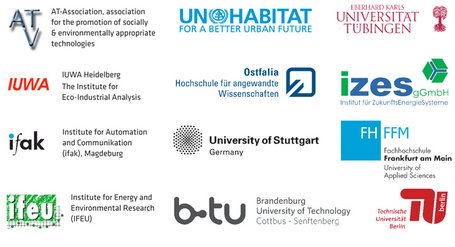Rapid Planning
sustainable infrastructure, environmental and resource management for highly dynamic metropolises

Subproject 2: Spatial and Environmental Planning – Analysis of Urban Development (01LG1301B)
Institution:
Brandenburg University of Technology Cottbus-Senftenberg (BTU-CS), Department of Environmental Planning
Duration: Apr. 2014 to Mar. 2019
Contact: Dr. Harry Storch - storch(at)b-tu.de
Rapid Planning (RP) is an action and user oriented research project. The goal is to develop an easy to apply trans-sectoral planning method with a strong focus on urban services and infrastructure provision, particularly in the sectors of energy, water, waste water, solid waste and urban agriculture. The research will be grounded in practical experiences and directly applied to the project case cities of Kigali (Rwanda), Da Nang (Vietnam) and Asyut (Egypt). Together with UN-Habitat, the transfer into practice and the transferability of the solutions will be tested.
The project organisation consists of five bodies. The coordination and evaluation unit ensures overall project management and internal project evaluation. The core group is responsible for the scientific work and any implementation. The stakeholder group cooperates with the core group for the realisation and operation of potential projects in the case cities. While, the advisory board is discussing the work of the core project team and enriches the work plan with ideas and approaches originating from an outside point of view. The case cities local offices will be established for project implementation at the local level.
The overall task of BTU-CS is to ensure the integration of the Rapid Planning methodology into the spatial and urban development planning framework of the case cities. Therefore BTU-CS will contribute to all relevant activities in relation to the development of the common spatial information framework and environmental impact assessments at the interface of environmental and urban development planning. To ensure the transfer into practice and the transferability of the solutions BTU-CS is responsible for the overall coordination of the "cities local project team organisation and focal points" and is thematically coordinating the focal city Da Nang City (Vietnam). Furthermore, BTU-CS heads the task for the "entry project" in Da Nang City. Finally BTU Cottbus is a contributor within all workpackages within the overall research project related to the transferability and dissemination of RP results.
Subproject 2: Spatial and Environmental Planning - Analysis of Urban Development is responsible for following deliverables:
- Development of a common spatial research framework based upon urban structure types.
- Documentation and review of the spatial planning systems of the case cities.
- Gap analysis of integration constraints for sustainable infrastructure management in the spatial planning framework of the case cities.
- Development of recommendations for integration options for the RP methodology in the case cities.
- Coordination of the implementation of the "entry project" in Da Nang, Vietnam.
The three selected case cities and Frankfurt as reference city represent a range between land-locked least developed (Rwanda), developing country (Vietnam), transition country (Egypt) and developed country (Germany); the cities, except Frankfurt, are characterised by rapid growth and planning needs.
The fact finding mission and project workshop in Da Nang, organised by BTU-CS and supported by UN Habitat Vietnam in 2012, has established a solid basis for cooperation with relevant departments and stakeholders in the city administration, universities and other supporting institutions.
Consortium leader: AT-Verband (AT-V), Stuttgart
Project homepage:http://www.rapid-planning.net
Social media:https://www.facebook.com/rapidplanning
Research partners:

Research partners:
German Federal Ministry of Education and Research (BMBF) / PT-DLR

